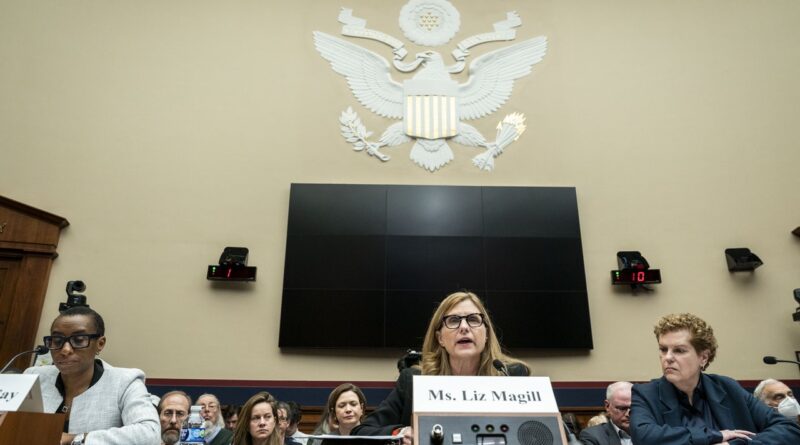Do American Colleges Have an Antisemitism Problem?
“Absolutely, Israel has the right to exist,” answered Kornbluth.
The hearings had a not-too-subtle whiff of the 1950s-style McCarthyism witch hunts, when citizens were called up to the House Un-American Activities Committee to answer, “Are you now, or have you ever been, a member of the Communist Party?” The question, no matter the answer, was meant to be a trap.
Antisemitism is indeed spiking across the country, including on college campuses. And it deserves to be challenged head on, as the Jewish students that gathered outside of the hearings made clear. The coalition of organizations that came together on Tuesday released a statement that read, in part:
Jack Starobin, a University of Pennsylvania student, argued: “Let’s be clear: Antisemitism is real. It’s important to take seriously. This year, Jewish spaces on Penn’s campus have been vandalized, and incidents of violence against Jewish people are on the rise in the US and around the world.”
But, he went on, “antisemitism is not a term to use to satisfy a political wish list, to censor students, or to justify a genocide. In the past two months, donors and politicians across the political spectrum have disregarded the gravity of the term antisemitism. They have conflated legitimate criticism of Israel with hate, and the University of Pennsylvania has caved to the pressure.”
Starobin has felt the force of that pressure directly: He is a cofounder of Penn Chavura, a Jewish club on campus that organized itself as a space outside of the university’s pro-Israel Hillel for Jewish students to have a home, regardless of their position on Israel. A planned and approved screening of Israelism, a film about American Jews whose unconditional support of Israel was shaken by a visit to the occupied West Bank, hosted by Penn Chavura was canceled suddenly and inexplicably by the campus administration after October 7.
One of the challenges posed by conflating instances of antisemitism with legitimate criticism of Israel — a nation-state currently engaged in an assault on Gaza that has claimed more than 20,000 lives, according to Gaza Health Ministry figures — is that it becomes impossible to track where and how antisemitism is actually growing. The Anti-Defamation League, an organization that tracks the rise of antisemitism, equates broad criticisms of Israel with antisemitism, and Jewish organizations calling for a ceasefire, such as Jewish Voice for Peace (JVP), have been among those labeled antisemitic “hate groups.”
JVP, for its part, has clarified that “antisemitism is discrimination, targeting, violence, and dehumanizing stereotypes directed at Jews because they are Jewish… We have also seen the use of Jewish stereotypes and conspiracy theories as part of racist ideologies.” On the Left, any “blaming [of] Jewish people for the actions of the Israeli government” is also antisemitic, and has no place in the movement. The organization has pointed to growing incidents of white nationalist antisemitic violence, such as the murder of 11 congregants at the Tree of Life Synagogue in Pittsburgh in 2018, the synagogue shootings at a Chabad Synagogue in Poway, California, in 2019, and Nazi symbols at the January 6, 2021, US Capitol insurrection.
From behind the bullhorn, MIT student Gabriella Martini recounted her own family history, which has been haunted by the Holocaust, and the toll that it took on her great-grandmother, who lost her entire family in Poland. Understanding the fear and trauma carried by many Jewish families, which has been reignited by the brutality of Hamas’s October 7 attack, she argued:
“I acknowledge that some students, faculty, and staff who are still reeling from the Hamas attack have felt deep discomfort, confusion, and alienation when encountering protests criticizing the actions of the Israeli government before and after October 7. But to claim that the existence of these protests has made MIT a place that is unsafe for Jews is, in effect, weaponizing their grief to dehumanize the protesters…. The point of these claims is not to ensure Jewish safety but instead to silence the voices of those who criticize the state of Israel. In doing so, they also silence the voices of a growing number of Jews who draw on their own history when fighting for Palestinians.”
Across campuses there are Jewish students like Martini expressing deep discomfort with the conflation of antisemitism and anti-Zionism. Among the student banners was a massive canvas that read: “Anti-Zionism =/= Anti-Semitism.” Demonstrating the extent to which these terms are being contested, that same day, the House of Representatives also passed a resolution that “clearly and firmly states that anti-Zionism is antisemitism.”
Many of the Jewish students I have spoken with believe that, ironically, the conflation serves to stoke, not eradicate, antisemitism. University presidents like Gay, Magill, Kornbluth, and others have arguably pitted Jewish students against other groups on campus by giving preferential treatment to antisemitism over other oppressions, particularly at a time when Arab, Muslim, and pro-Palestine students are also being harassed, doxxed, and assaulted on campuses. They have set up task forces on antisemitism and have sought out the perspectives and experiences of pro-Israel, Jewish students, while ignoring complaints by Arab and Muslim students, as well as pro-Palestine Jews.
Furthermore, equating Judaism with the state of Israel — at a time when that state is engaged in what human rights organizations are calling war crimes — has the effect of painting Jews as a monolithic group that supports the unrelenting bombing, trapping, and starving of another people.
As Harvard professor Sara Roy told me, “When you single out antisemitism this way, you’re exceptionalizing Jews again,” rather than confronting antisemitism as “part of a larger, inclusive intersectional battle against all forms of prejudice and discrimination.” Roy, who is a Jewish daughter of Holocaust survivors, adds, “That is really bad for us.” Antisemitism has a long history of being used at moments of crisis to single out and scapegoat Jews, and to pit them against other oppressed groups.





